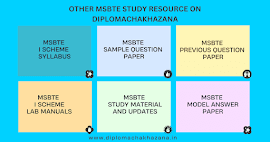In this post diploma in civil engineering students can download MSBTE Model Answer Paper I scheme for all semesters. MSBTE question paper with answer can help you to score very good marks in the msbte final exam. In this post we will also discuss about various topics or question each and every civil engineering student has in his mind like what are the job opportunities after completing polytechnic from civil branch? what skill do civil engineers need? what is the highest position in civil engineering? What are the 5 types of civil engineering? etc. Read the article till end and you will get answers of many questions and you will also able to download msbte question bank with answers from this post as well.
(Click on image to open main menu)
Other MSBTE Study Resources On Our Website
MSBTE Question Paper With Answer of I Scheme 1st semester Civil Branch
22103 Basic Mathematics
22101 English
MSBTE Question Paper With Answer of I Scheme 2nd semester Civil Branch
22201 Applied Mathematics
22204 Construction Materials
22203 Applied mechanics
22205 Applied Science
MSBTE Question Paper With Answer of I Scheme 3rd semester Civil Branch
22303 Mechanics of Structures
22302 Highway Engineering
22305 Concrete Technology
22304 BUILDING CONSTRUCTION
22301 Advanced Surveying
MSBTE Question Paper With Answer of I Scheme 4th semester Civil Branch
22401 Hydraulics
22402 Theory of Structure
22403 Railway and Bridge Engineering
22404 Geotechnical Engineering
22405 Building Planning and designing
MSBTE Question Paper With Answer of I Scheme 5th semester Civil Branch
22501 Water Resource Engineering
22502 Design of Steel and RCC Structure
22508 Precast and Pre-stressed Concrete (Elective)
22503 Estimating and Costing
22504 Public Health Engineering
22505 Rural Development (Elective)
MSBTE Question Paper With Answer of I Scheme 6th semester Civil Branch
Students can download MSBTE Sample Question Papers as there are no answer papers available for 6th semester click here to download
Other Study Resources On Our Website
Important Question and Answers:-
What are the job opportunities after completing diploma from civil branch?
Completing a diploma from civil branch opens up various job opportunities
in both public and private sectors. Graduates can work as civil engineers,
site supervisors, construction managers, project engineers, and quantity
surveyors, among others. They can also work in government agencies like PWD,
CPWD, and NHAI, or in private companies such as L&T, Tata Projects, and
Punj Lloyd, to name a few
What skills do civil engineers need?
Civil engineers need a combination of technical, creative, and communication
skills to design and oversee the construction of infrastructure such as
buildings, roads, bridges, and water supply systems.
Some important skills include:
Analytical skills: Civil engineers need to be able to analyze complex
problems and come up with solutions that are safe, practical, and
cost-effective.
Technical skills: Civil engineers need to have a strong foundation in
mathematics, physics, and engineering principles. They also need to be
proficient in using design software and other tools.
Communication skills: Civil engineers must be able to communicate their
ideas clearly and effectively to clients, contractors, and other team
members.
Project management skills: Civil engineers need to be able to manage
projects from start to finish, including budgeting, scheduling, and
overseeing construction activities.
Creativity: Civil engineers need to be able to think creatively to come up
with innovative solutions to engineering challenges.
Attention to detail: Civil engineers must pay close attention to detail to
ensure that designs are accurate and construction activities are carried out
correctly.
Teamwork: Civil engineers often work as part of a team with architects,
construction managers, and other professionals, so they must be able to
collaborate effectively and work well with others.
What is the highest position in civil engineering?
The highest position in civil engineering is typically the role of Chief
Civil Engineer or Chief Engineering Officer (CEO). This is a high-level
executive position in which the individual is responsible for overseeing and
directing all engineering activities within an organization, such as a
construction firm, government agency, or engineering consulting firm. The
CEO typically has many years of experience and has demonstrated strong
leadership, strategic planning, and decision-making skills in their career.
They also have a deep understanding of engineering principles and are able
to apply this knowledge to complex projects and initiatives.
What is the pass percentage for MSBTE?
The minimum passing marks for MSBTE (Maharashtra State Board of Technical
Education) diploma exams is 40% of the total marks in each subject. This means
that a student needs to obtain at least 40 marks out of 100 to pass the exam.
Additionally, the student must also obtain a minimum of 35% marks in the
practical or sessional work of each subject. If a student fails to achieve the
minimum passing marks in any subject, they will have to appear for the exam
again in the next semester.
If you are I scheme student the you have to score 28 mark out of 70 to pass in
msbte exam.
What are the 5 types of civil engineering?
Civil engineering is an important field that involves designing,
constructing, and maintaining infrastructure and public works. There are
many different types of civil engineering, but the five main branches are
structural engineering, geotechnical engineering, transportation
engineering, water resources engineering, and environmental engineering.
Structural engineering is all about designing and analyzing structures such
as buildings, bridges, and dams. Structural engineers make sure that these
structures can withstand the stresses and loads they will experience during
their lifetime. This is important because we rely on these structures for
our safety and well-being.
Geotechnical engineering, on the other hand, focuses on the interaction
between structures and soil or rocks. Geotechnical engineers analyze and
design tunnels, foundations, and retaining walls, making sure that these
structures are stable and safe.
Transportation engineering is all about designing and maintaining
transportation infrastructure. This includes highways, airports, railroads,
and mass transit systems. Transportation engineers make sure that these
systems are safe, efficient, and sustainable.
Water resources engineering involves managing our water supply, irrigation,
drainage, flood control, and wastewater treatment. Water resources engineers
design systems to ensure that we have enough water for our needs, while also
protecting our environment from pollution and other harmful effects.
Finally, environmental engineering focuses on protecting and improving our
environment. Environmental engineers design and implement systems and
processes to improve air and water quality, manage waste disposal, and
reduce pollution.
In summary, civil engineering is a diverse field that encompasses many
different types of engineering. The five main branches of civil engineering
are structural, geotechnical, transportation, water resources, and
environmental engineering. Each of these branches plays an important role in
designing and maintaining the infrastructure and public works that we rely
on every day.
Conclusion
You can download msbte question bank with answers and study for your
final exam. MSBTE question paper with answer for all semester is
available in this post for msbte students.












0 Comments
Please feel free to comment. Being diploma students We are always ready to help diploma Students